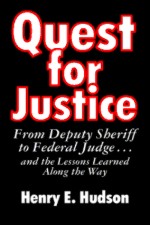
QUEST FOR JUSTICE
Excerpt . . .
The rugged, thinly populated territory occupying the panhandle of Idaho is a paradise for those who love the outdoors. The air is crisp. Trout fill the mountain streams. Wildlife abounds in the endless pristine timberland. Snow graces the mountain peaks most months of the year. Life in this region lacks rigidity and structure. Time is measured in terms of productive daylight hours. The inhabitants like it that way. That’s why they live there. The panhandle area has a reputation for harboring those seeking freedom from urban frenzy, oppressive government, unwanted family ties, and often, the law. Naples, Idaho, is situated within Boundary County about forty miles from the Canadian border. Mountainous and in places desolate, Boundary County offers residents comparatively simple life, built on a bedrock system of time-tested values and traditions. Staunchly conservative, folks from Boundary County resist government in their lives, and distrust its representatives, particularly those who threaten their way of life. The outdoors plays a central role in their bucolic lifestyle. It is said that people from Northern Idaho learn to shoot before they learn to walk. Whether that is true or not, one thing’s for certain. People in Boundary County believe the Second Amendment to the U.S. Constitution gives them an inalienable right to own and use firearms—of all types. No right is more fundamental, no notion is more commonly held. You won’t find any industrial plants, military bases, or business parks in Boundary County. Its nine thousand or so residents live off the land—farming, hunting, fishing, or trapping. There’s a special sanctity to their land. Poaching or trespassing can be hazardous. Folks prefer self-help legal remedies to anything the law could provide. But it would be unfair to call these people lawless. Law to them is a social contract to live and let live; not governmentally pronounced and enforced rules of conduct. Boundary citizens are proud of their independence. They neither request nor expect any form of assistance from the federal government. They live by a simple creed—a government that governs least, governs best. Why would the Bureau of Alcohol, Tobacco and Firearms (ATF) be interested in a man who lived in virtual isolation with his family on a mountainside called Ruby Ridge? That was a question Randy Weaver and his family continually asked, as did his neighbors in Boundary County, Idaho. In time, the same question would be asked by U.S. Marshals. In December 1990, Randall Weaver was indicted by a federal grand jury in Idaho for allegedly selling two sawed-off shotguns to a confidential informant, working under the direction of an ATF agent. According to the indictment and related documents, Weaver sold the undercover operative a Harrington and Richardson .12-gauge single-shot shotgun with a barrel cut to thirteen inches. The gun measured a total of 19.25 inches. In addition, Weaver provided the agent a Remington .12-gauge pump action shotgun with a barrel cut to 12.75 inches. This weapon had an overall length of 24.5 inches . . .
large bulletin board prada driving shoes sailing captain hat red prada hat prada cloudbust shoes online shop gucci prada doctor bag instagram viewer followers carlucci 100 followers instagram cardinal supply st louis mo prada key wallet designer glasses prada bandoliera prada concept printing prada shoulder purse chatgpt programming manage instagram followers chatgpt چیست prada ski pants prada logo sweater chatgpt search engine innovative printing solutions men prada boots old prada bags gain followers instagram ferragamo outlet store online instagram fast followers gucci shoes outfit ysl handbags outlet willams chicken prada snakeskin bag roofing supplies st louis mo guccia prada jordans amazing grace in cherokee native american prada t shirts chatgpt founders prada loafers styled www.gucci.com usa real captain hat devil.wears prada cast ferragamo outlet online prada sunglasses star rosemont lunch 500 instagram followers openapi chatgpt used prada shoes bandoliera prada prada panties prada gold purse prada mens eyewear prada bear online factory outlets corkboard roll bojangle baits innovative print solutions bojangle baits rosemont restaurants in the park m nii shorts prada buy remove instagram followers prada sunglasses gold prada shirt mens cheap prada purses 50k followers instagram prada outlet shoes what are print concepts prada españa kpop instagram followers instagram glitch followers mochila prada prada triangle earrings gucci ecommerce restaurants near 60018 usa instagram followers corkboard roll carlucci s outlet crossbody bags cardinal supply st louis instagram followers number camisas prada spiky fruit with white inside chatgpt founders qutlets yacht captain shirt tamagotchi pet fluffy prada bag prada short hills prada bags cost firehouse subs carrollwood captain hat gucci b franchise fried chicken italian restaurant rosemont il ark radiation suit gucci shoe bag prada camarillo outlet corkboard sheets neal.mccoy tour borse prada prada small crossbody prada factory outlet comprar instagram followers catalina island visitors guide prada frame glasses prada sunglasses rectangular prada leather prada eyewear women prada bags cost prada sports bra chatgpt hype premier gymnastics lutz chatgpt poem prada mens trainers amazing grace native american factory online stores
by Henry E. Hudson
$24.95